 Petzlover
Petzlover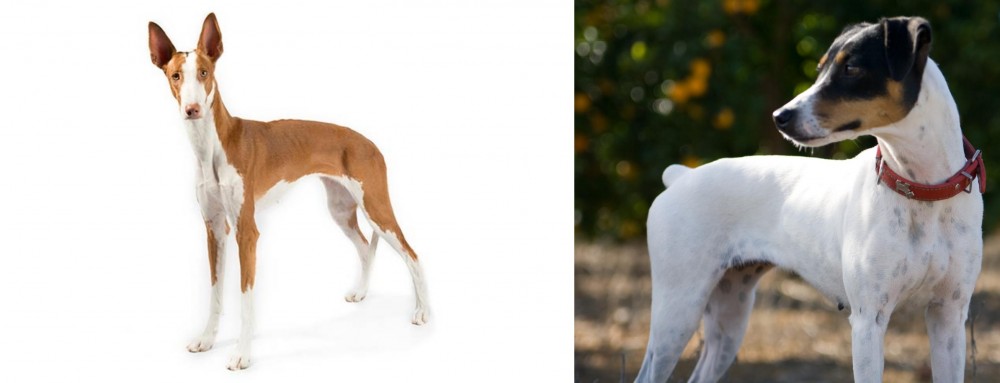 Both Ibizan Hound and Ratonero Bodeguero Andaluz are originated from Spain. Ibizan Hound may grow 31 cm / 13 inches higher than Ratonero Bodeguero Andaluz. Ibizan Hound may weigh 20 kg / 45 pounds more than Ratonero Bodeguero Andaluz. Ibizan Hound may live 6 years less than Ratonero Bodeguero Andaluz. Ibizan Hound may have more litter size than Ratonero Bodeguero Andaluz. Both Ibizan Hound and Ratonero Bodeguero Andaluz requires Low Maintenance.
Both Ibizan Hound and Ratonero Bodeguero Andaluz are originated from Spain. Ibizan Hound may grow 31 cm / 13 inches higher than Ratonero Bodeguero Andaluz. Ibizan Hound may weigh 20 kg / 45 pounds more than Ratonero Bodeguero Andaluz. Ibizan Hound may live 6 years less than Ratonero Bodeguero Andaluz. Ibizan Hound may have more litter size than Ratonero Bodeguero Andaluz. Both Ibizan Hound and Ratonero Bodeguero Andaluz requires Low Maintenance.
 This lean, speedy and agile hound dog looks and acts very much like a Pharaoh Hound except the Ibizan Hound is larger and a different color. The image of dogs that look like the Ibizan have been seen since 3400 BC in Egypt. The dogs were probably brought by sailors to Ibiza and surrounding islands. They came about 700-900 BC. It is believed that they actually came for the island of Elvissa and Spain, where they speak Catalan. It was also known in France as the le chanigue. There job was the same. To hunt rabbits.
This lean, speedy and agile hound dog looks and acts very much like a Pharaoh Hound except the Ibizan Hound is larger and a different color. The image of dogs that look like the Ibizan have been seen since 3400 BC in Egypt. The dogs were probably brought by sailors to Ibiza and surrounding islands. They came about 700-900 BC. It is believed that they actually came for the island of Elvissa and Spain, where they speak Catalan. It was also known in France as the le chanigue. There job was the same. To hunt rabbits.
They were fast hunting greyhound type dogs. They hunted for rabbit for the Ibizaners and themselves. These dogs hunt by day and by night. They are not just sight hounds, they also hunt by smell and hearing, in packs or by themselves. They use their sight to find and corner the prey. Then they act like retrievers and bring it back to the hunter. Their function and look is very similar to several other dogs such as the Pharaoh Hound, the Greyhound, the Portuguese Podengo, the Cimeco dellEtna and the Podence Canario. The Ibizan is larger than any of these, but all these breeds are considered to be “primitive”.
Within the breed itself there are smooth, wire and longhaired Ibizan Hounds. The Smooth is by far the most common. A great jumper, nimble runner built for stamina, the Ibizan Hound was just what the island people needed. The breed lived in isolation on the island for many centuries, under a variety of rulers including the Romans, Egyptians, Vandals, Carthaginians, Chaldeans, Arabs and Spanish. Because of the harsh island conditions, the farmers only allowed the best hunters among the Ibizan Hounds to procreate thus assuring a breed that is unchanged from ancient stock.
By 1950 the Ibizan Hound was brought to America. Because this dog is not a pet but a working machine, it took awhile for the breed to become popular enough to be recognized by the American Kennel Club (AKC) in 1979. Still the Ibizan Hound is a rare breed with the female being a better hunter than the male. One of the most common activities of this breed in the U.S. is lure coursing. These events are sponsored by AKC and ASFA as well as racing events in the NOTRA and LGRA.
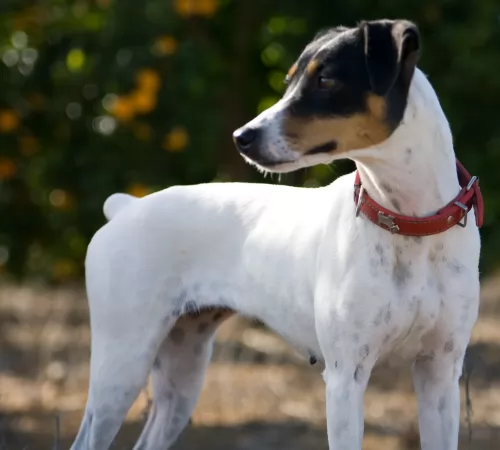 Long ago the English visited Spain to sample their wines, bringing with them smooth coated English Fox Terriers which were later crossed with other dog breeds of the area.
Long ago the English visited Spain to sample their wines, bringing with them smooth coated English Fox Terriers which were later crossed with other dog breeds of the area.
It is believed that the Andalusia Ratter’s ancestors were smooth coated fox terriers. The Club Nacional del Perro Andaluz Ratonero Bodeguero was established and in 1993 a standard for the breed was set.
It is only fairly recently that the breed was recognized by the Royal Canine Society of Spain but it isn’t recognized by any of the major kennel clubs.
 The breed is agile, elegant, athletic and graceful. At the same time the Ibizan Hound is a fierce hunter travelling at unreal speeds to catch his rabbit prey. They are a hardy breed with a lean and long neck, and a lean, muscled body with laid back shoulders. The ears are specific to the breed, with a broad base leading to long, beautiful ears. They have tan eye rims, nose, foot pads, and ears. The eyes themselves are an amber with an intelligent and alert expression.
The breed is agile, elegant, athletic and graceful. At the same time the Ibizan Hound is a fierce hunter travelling at unreal speeds to catch his rabbit prey. They are a hardy breed with a lean and long neck, and a lean, muscled body with laid back shoulders. The ears are specific to the breed, with a broad base leading to long, beautiful ears. They have tan eye rims, nose, foot pads, and ears. The eyes themselves are an amber with an intelligent and alert expression.
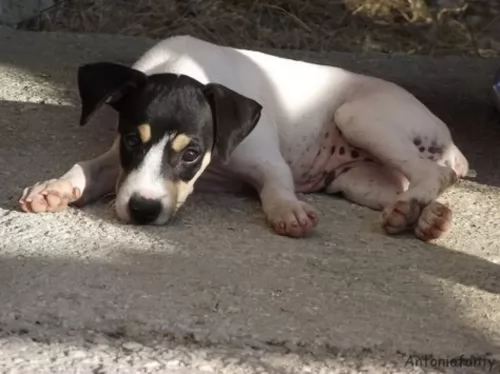 Also known as the Spanish Jack Russell, the Ratonero Bodeguero Andaluz looks very similar to this popular Jack Russell Terrier.
Also known as the Spanish Jack Russell, the Ratonero Bodeguero Andaluz looks very similar to this popular Jack Russell Terrier.
He is a small to medium sized dog with a lean, muscular body. The Ratonero developed in the south of Spain and is thought to be a mix of local ratting dogs and Fox Terriers. This ensured a quick, agile hunter.
The dog stands at between 35 – 43cm in height and weighs 6 - 9kg. The dog’s head is fairly small with dark brown eyes and half erect-half floppy ears. The coat is mainly white with some freckling. It is short and smooth with shades of black and tan covering the facial area. Some of these dogs are born with a natural bob-tail.
These dogs are known to have robust, hearty, happy personalities, full of the joys of living. They get on well with children as well as other pets if they have grown up with them.
Introductions should be slow if one of these dogs are brought into a home where there are already other pets. He is a very active breed and will be requiring plenty of mental stimulation and physical exercise.
They can provide quite a bit of entertainment for their human families as they can become quite clownish. They’re the kind of dogs that can adapt to life in the countryside or the city.
 They love children but be careful they do not knock them over and don’t let the children play to rough.
They love children but be careful they do not knock them over and don’t let the children play to rough.
Exceptional jumping ability, speed and stamina.
Must have a large fenced yard and a place to run full out.
Very intelligent with excellent learning ability.
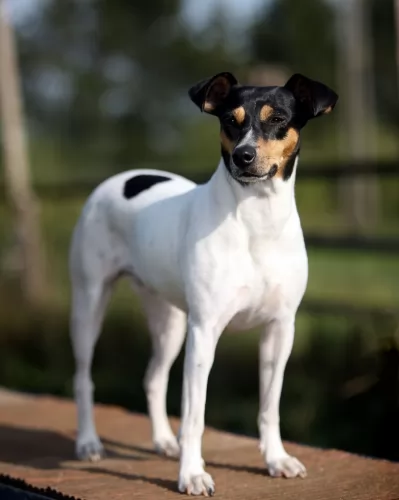 Your Ratonero Bodeguero Andaluz to this day is a ratter, always alert and ready to spring on prey. He is always lively and friendly, and with his loving nature, makes a splendid companion for his human family.
Your Ratonero Bodeguero Andaluz to this day is a ratter, always alert and ready to spring on prey. He is always lively and friendly, and with his loving nature, makes a splendid companion for his human family.
He is also a stubborn dog, liking to go his own way, and therefore will require training and socialization. He is an adaptable little dog too and when you bring him into your home he is willing to adapt to your way of life and become a loyal and loving member of your family.
 Despite being isolated on the islands for all those years, the Ibizan Hound has several tendencies toward medical issues:
Despite being isolated on the islands for all those years, the Ibizan Hound has several tendencies toward medical issues:
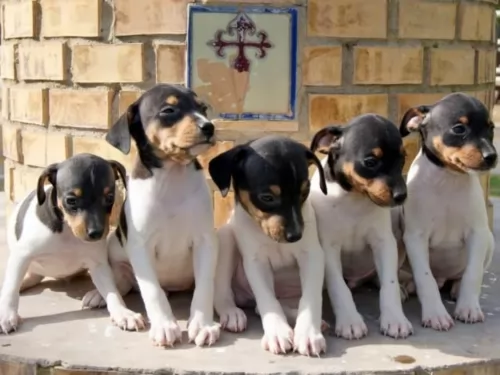 With good care, your Andalusian Ratter isn’t likely to get sick, but still, you would be better off knowing about some of the common dog diseases your pet could get.
With good care, your Andalusian Ratter isn’t likely to get sick, but still, you would be better off knowing about some of the common dog diseases your pet could get.
This is usually seen in young dogs where there is lameness in the hind legs and hip pain. It is believed that Legge Perthe’s occurs because of a genetic predisposition, and when it develops, there is sadly no cure.
Skin infections may seem fairly mild but nothing can be further from the truth. They can be painful and frustrating. Skin redness, dryness, itchiness and pain can cause your pet to lick and bite and make the situation worse. If your pet is being driven crazy by a skin irritation, get him to the vet who will do a complete physical examination.
Other diseases to be aware of include hip dysplasia, obesity, epilepsy and bloat.
 Your Ibizan Hound is an athlete and needs to be fed like one. As a puppy he needs high quality breed or group (hound) specific food. Feed her 3-4 times a day based on calories. A puppy needs about 866 calories each day.
Your Ibizan Hound is an athlete and needs to be fed like one. As a puppy he needs high quality breed or group (hound) specific food. Feed her 3-4 times a day based on calories. A puppy needs about 866 calories each day.
If your dog participates in sports as adults, they need between 1450 and 2900 calories each day. The exact amount depends on how much activity the dog is engaged in. Feed at least 2 times a day.
Great speed and stamina
Your Ibizan Hound is a working athlete. He needs a lot of exercise and he needs a chance to run full out so access to land is essential. It can be a large back yard, or it can be a dog park. No matter what it is, it is essential for the Ibizan Hound. She will also require long walks at least a couple times a day. However, do not over exercise your puppy. They are great jumpers as well as runners.
The sport of lure coursing was made for the Ibizan in the same way that it was made for the Greyhound. They are good at Flyball and agility as well.
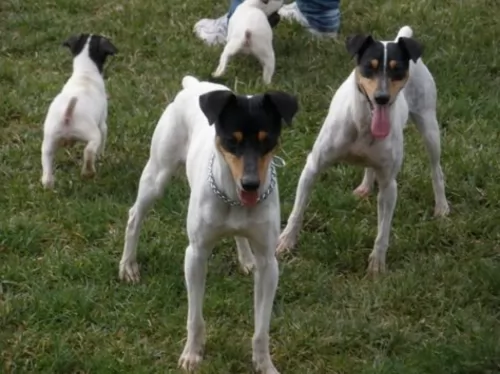 This is a fairly low maintenance dog as the short smooth coat will be easy to brush twice a week.
This is a fairly low maintenance dog as the short smooth coat will be easy to brush twice a week.
Check him over for unusual lumps, trim his nails and check inside his ears, look into his eyes to ensure they are bright and alert and look inside his mouth to make sure he doesn’t have any rotten teeth.
Have your pet neutered or spayed if you want to avoid puppies. This can be beneficial for your pet’s health too.
Feed your Ratonero Bodeguero Andaluz only the best food there is. If you opt for commercially manufactured food, make sure its full of vitamins and minerals. Your little pet will want consistency and simplicity with his food to avoid digestive problems.
Try and provide him with some home-made food which can be added to the dry kibble twice a week as a treat. Boiled chicken, brown rice or pasta and spinach, sweet potatoes and carrots all chopped up ad mixed into the dry kibble will ensure your pet’s health.
Some raw meat added in occasionally will also go towards ensuring his good health.
Always make sure he has access to fresh, cool water.
Provide him with a safe, dry, warm, comfortable place to sleep.
Get him to the vet when you see he is sick.
Ensure he has sun and shade in the garden.
Never ever leave him in a hot car.